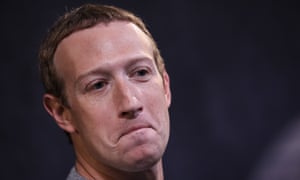Facebook is out of control. If it were a country it would be North Korea
If the combined might of brands like Unilever and Coca-Cola don’t scare Mark Zuckerberg, who can hold the social media platform to account?
\Sun 5 Jul 2020 08.00 BST
 Facebook founder Mark Zuckerberg. Photograph: Drew Angerer/Getty Images
Facebook founder Mark Zuckerberg. Photograph: Drew Angerer/Getty Images
T is no power on this earth that is capable of holding Facebook to account. No legislature, no law enforcement agency, no regulator. Congress has failed. The EU has failed. When the Federal Trade Commission fined it a record $5bn for its role in the Cambridge Analytica scandal, its stock price actually went up.
Which is what makes this moment so interesting and, possibly, epochal. If the boycott of Facebook by some of the world’s biggest brands – Unilever, Coca-Cola, Starbucks – succeeds, it will be because it has targeted the only thing that Facebook understands: its bottom line. And if it fails, that will be another sort of landmark.
Because this is a company that facilitated an attack on a US election by a foreign power, that live-streamed a massacre then broadcast it to millions around the world, and helped incite a genocide.
I’ll say that again. It helped incite a genocide. A United Nations report says the use of Facebook played a “determining role” in inciting hate and violence against Myanmar’s Rohingya, which has seen tens of thousands die and hundreds of thousands flee for their lives.
Facebook is not a mirror. It’s a gun. Unlicensed, out of control, in the hands of 2.6 billion people across the planet
I often think about that report. When I watch documentaries showing Facebook employees playing ping-pong inside their Menlo Park safe space. When I took a jaunt to the suburban Silicon Valley town earlier this year and strolled down the “normal” street where Mark Zuckerberg lives his totally normal life as the sole decision-maker in a company the like of which the world has never seen before. When I heard that Maria Ressa, the Filipino journalist who has done so much to warn of Facebook’s harms, had been sentenced to jail. When I read the Orwellian defence that our former deputy prime minister Nick Clegg wrote last week. “Platforms like Facebook hold a mirror up to society,” he said.
Facebook is not a mirror. It’s a gun. Unlicensed – it is not subject to laws or control – it is in the hands and homes of 2.6 billion people, infiltrated by covert agents acting for nation states, a laboratory for groups who praise the cleansing effects of the Holocaust and believe 5G will fry our brainwaves in our sleep.
People sometimes say that if Facebook was a country, it would be bigger than China. But this is the wrong analogy. If Facebook was a country, it would be a rogue state. It would be North Korea. And it isn’t a gun. It’s a nuclear weapon.
Because this isn’t a company so much as an autocracy, a dictatorship, a global empire controlled by a single man. Who – even as the evidence of harm has become undeniable, indisputable, overwhelming – has simply chosen to ignore its critics across the world.
Instead, it has continued to pump out relentless, unbelievable, increasingly preposterous propaganda even as it controls the main news distribution channels. And just as the citizens of North Korea are unable to operate outside the state, it feels almost impossible to be alive today and live a life untouched by Facebook, WhatsApp and Instagram.
The #StopHateForProfit campaign is focused on hate speech. It’s what has united six American civil rights organisations in the US to lobby advertisers to “pause” their ads for July, a campaign precipitated by Facebook’s decision not to remove a post by Donald Trump threatening violence against Black Lives Matter protesters: “When the looting starts, the shooting starts.”
But this is so much bigger than Facebook’s problem with hate. And it goes far far beyond the US, though the role it will play in the US election is pivotal (and it’s worth noting that #StopHateForProfit’s demands don’t extend to stopping lies in political ads, a crucial necessity). Facebook’s harms are global. Its threat to democracy is existential.
Is it a coincidence that the three countries that have dealt with coronavirus worst are those with populist leaders whose campaigns exploited Facebook’s ability to spread lies at scale? Trump, Bolsonaro, Johnson. Perhaps. Perhaps not
And if you don’t care about democracy, think for a moment about coronavirus. If and when a vaccine comes along, will enough people want to have it? Facebook is riddled with anti-vaxxing like it’s infected by antisemitism. If that’s a mirror, Nick, you might want to take a long, cold, hard look in it.
Zuckerberg is not Kim Jong-un. He’s much, much more powerful. “My guess is that all these advertisers will be back on the platform soon enough,” he is reported to have told employees last week. And although 500 companies have now joined the boycott, the Wall Street Journal reports this represents only a 5% dip in profits. It may turn out that Facebook isn’t just bigger than China. It’s bigger than capitalism.
It comes, in the end, down to us and our wallets and what we say to these brands. Because the world has to realise that there’s no one and no thing coming to the rescue. Trump and Zuckerberg have formed an unspoken, almost certainly unstated, strategic alliance. Only the US has the power to clip Facebook’s wings. And only Facebook has the power to stop Trump spreading lies.
Sometimes you don’t realise the pivotal moments in history until it’s too late. And sometimes you do. It’s not quite yet too late. Just almost.
My Comments :
1. Carole Cadwalladr has been the award winning investigative journalist, who - almost single-handedly - laid bare the destructive and fraudulent factor, big ICT tech did play in determining the outcome of both the 2016 (advisory) EU Brexit-Remain referendum and the 2016 USA presidential and congressional election.
1. Carole Cadwalladr has been the award winning investigative journalist, who - almost single-handedly - laid bare the destructive and fraudulent factor, big ICT tech did play in determining the outcome of both the 2016 (advisory) EU Brexit-Remain referendum and the 2016 USA presidential and congressional election.
2. What did surprise me mostly at the time however, was the fact that the organisational machinery, responsible for the pivotal (completely stealthily) steering influence on the mind of the electoral both in the UK and the USA, had been delivered by the very same companies (SCL-Cambridge Analytica), that had been - and are still being - used by NATO / CIA, to establish regime change by software (versus regime change by military hardware).
3. The immediate question rising from this observation is - while the national security services must have been fully aware of the voter manipulation (by their usual contractors) at the time - why did not they try to stop these activities or at least inform the public about them.
3. The immediate question rising from this observation is - while the national security services must have been fully aware of the voter manipulation (by their usual contractors) at the time - why did not they try to stop these activities or at least inform the public about them.
4. Did key parts of the services, favour the final outcome (*), or were they afraid, that by exposing the electoral manipulation, the instrument of their choice would be declared explicitly illegal (which it seems not to have been at the time, because the electoral legislation in the west had not been timely updated).
5. So can the security services be held (at least partially) responsible for the (potentially distorted) outcome of the aforementioned elections / referendum?
6. In what way(s) are the social media - including super datamining / mega-advertising Facebook - been perceived by the security services (in general / globally) : as useful and powerful tools, to achieve their (mostly by covert actions) goals?
7. If the security services do perceive social media as powerful tools indeed, are the people at the top of companies like Facebook, factually overtly / covertly cooperating with these services, and if the answer is affirmative, in what way?
8. Are they themselves (voluntarily) part of the security apparatus or is their cooperation a consequence of leverage, that the services are employing against them, to make them act accordingly?
9. Since one of the major characteristics of social media is its global reach, one might ask, whether it is plausible, that those media might be the subject of (systematic) use / abuse by "foreign powers" (and I am not just referring to the apparently obvious states, like Russia and its corrupt Putin regime and / or China with its highly developed, ICT driven repressive crowd control systems).
10. The shocking Gladio revelations in the nineties did learn the public (if susceptible to those highly inconvenient truths that is), of the extremely manipulative nature (to control the life of the electorate for example) of the very same security services as the ones that nowadays are using the manipulative power of social media, in order to introduce alternative facts, to just mention a certain aspect.
11. Alternative facts, presented to the general public by numerous extreme-right leaning organisations using all sorts of social media channels, about the supposedly dangerous mindset and ditto motives of those people that are inclined to fight against the downfall of democracy and for the conservation of our planet.
12. Seemingly along the very same patterns, that the very same security services (CIA / MI6 and military security services via NATO, to name just a few) tried to influence public opinion in Europe (and the USA) in the first four or five decades after WWII.
13. Influencing public opinion (so influencing the outcome of elections) for example by way of the traditional media and by way of deliberately organising major acts of terrorism against the public, which subsequently had been blamed on the left (while in fact being perpetrated by right wing extremists, narrowly cooperating with the security apparatus and radical right wing political extremists).
14. If one does consider the parallels between (a number of) the authorities then and now as a striking resemblance, one has to ask the central question, whether the looming elections in the USA during the autumn, (again) will be under direct / indirect threat from the security services, both nationally and internationally.
15. Under threat that is, apart from the "usual" highly fraudulent manipulations by the USA national political parties and their allies (among other ways, represented by PACs and super-PACs), by way of widespread "traditional" (versus ICT / social media related) voter suppression and the ever continuing gerrymandering.


Geen opmerkingen:
Een reactie posten
Opmerking: Alleen leden van deze blog kunnen een reactie posten.